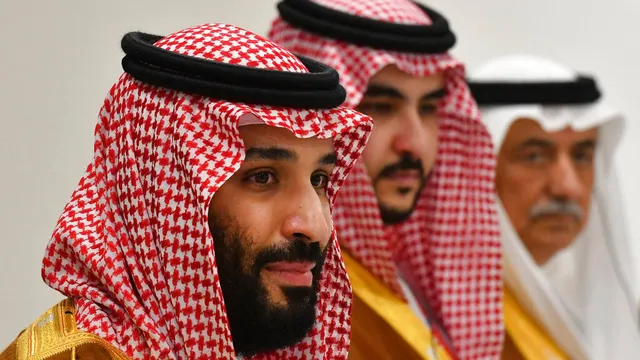
Saudi Arabia demands ousting of Hamas for peace negotiations
2025-07-04 12:36- Saudi Arabia demands the removal of Hamas from Gaza leadership as a condition for peace talks with Israel.
- Hamas might consider exile for its leadership and a halt on arms smuggling, although complete disarmament is unlikely.
- The future of Saudi-Israel relations hinges on the Palestinian Authority regaining control and the effective removal of Hamas.
Express your sentiment!
Insights
Saudi Arabia has positioned itself as a critical player in the complexities of the Israel-Palestine conflict, particularly regarding the ongoing situation in Gaza. Following the Hamas-led attacks on October 7, 2023, which disrupted potential normalization talks with Israel, Riyadh has placed demands on Hamas. The Saudi government has publicly stated that the removal of Hamas from power in Gaza is crucial for any progress toward formalizing relations with Israel and reinstating the Palestinian Authority's presence in the region. Despite the humanitarian crisis, Saudi Arabia's stance indicates that they believe lasting peace cannot be achieved without tackling Hamas's leadership, as underscored by a diplomatic source emphasizing the need to eliminate the group for peace to be attainable. Meanwhile, Prime Minister Benjamin Netanyahu has voiced strong opposition to reintegrating the Palestinian Authority in Gaza, arguing against their historical record of supporting terrorism. Therefore, pressure for resolution remains mixed amid considerations for civilian safety and broader geopolitical relations in the region. Amid these tensions, Hamas has reportedly shown some flexibility by considering the exile of a small number of leaders and a halting of arms-related activities in exchange for a potential ceasefire. This reported shift suggests that Hamas is exploring options to de-escalate the situation, even though full compliance with Israeli demands seems unlikely. The three core conditions set by Israel for peace include the disarmament of Hamas, the exile of key leaders, and the conclusion of Hamas's rule over Gaza. Observers note that the proposed measures could signal a significant turning point, especially if Hamas's internal governance appears under threat. As indirect negotiations continue, a phased ceasefire is being discussed, with the potential release of hostages by Hamas in exchange for a reduction in hostilities. Notably, the involvement of international mediators such as the U.S. adds another layer to this multilayered relationship, as they press both sides toward an agreement amidst rising tensions in Gaza. The Saudi Foreign Minister has underscored that humanitarian issues in Gaza remain a priority while also reaffirming that recognition of Israel is contingent upon Palestinian statehood.Clearly, the conflicting sets of interests present a complex matrix that will require deft diplomacy moving forward to ensure stability and peace in the region.
Contexts
The history of Saudi Arabia's position on Israel and Palestine is complex and rooted in regional politics, religious significance, and national interests. Since the establishment of the State of Israel in 1948, Saudi Arabia has publicly supported the Palestinian cause while simultaneously navigating a challenging relationship with Israel. Initially, Saudi Arabia opposed the creation of Israel, aligning itself with broader Arab sentiment and supporting various military and diplomatic efforts aimed at opposing Israeli actions in Palestinian territories. This stance has remained a cornerstone of Saudi foreign policy, often characterized by vocal criticism of Israel's occupation of Palestinian lands and its settlement activities in the West Bank. In the decades following Israel's establishment, Saudi Arabia's position has evolved with changing geopolitical landscapes. The 1979 Islamic Revolution in Iran introduced a significant shift in regional dynamics, leading to a newfound focus among Arab nations on countering Iranian influence rather than solely addressing the Palestinian issue. The Saudi leadership has often called for a unified Arab response to Israeli policies but has also recognized the importance of pragmatic diplomatic relations with Israel. The late King Abdullah's 2002 Arab Peace Initiative, which offered normalizing relations with Israel in exchange for a complete withdrawal from occupied territories, marked a significant moment in this evolution, indicating a willingness to consider peace based on mutual recognition and respect. In recent years, the dynamics surrounding Saudi Arabia's stance towards Israel and Palestine have further been influenced by the rise of Iran as a regional power and the threats posed by extremist groups. The Kingdom has increasingly viewed Israel as a potential partner in countering Iranian aggression, leading to clandestine cooperation and back-channel talks. In 2020, as part of the broader normalization trend initiated by the UAE and Bahrain, Saudi Arabia maintained a cautious approach towards official relations with Israel, reiterating its commitment to the Palestinian cause while quietly strengthening ties with the Israeli government. As of 2025, Saudi Arabia's position remains one rooted in complexity. The Kingdom continues to call for the establishment of a Palestinian state and supports international efforts to resume peace talks based on the two-state solution while managing its pragmatic security concerns. The balancing act between solidarity with the Palestinians and the necessity of strategic relations with Israel underscores the nuanced and evolving nature of Saudi Arabia's foreign policy in the context of one of the most protracted conflicts in modern history.